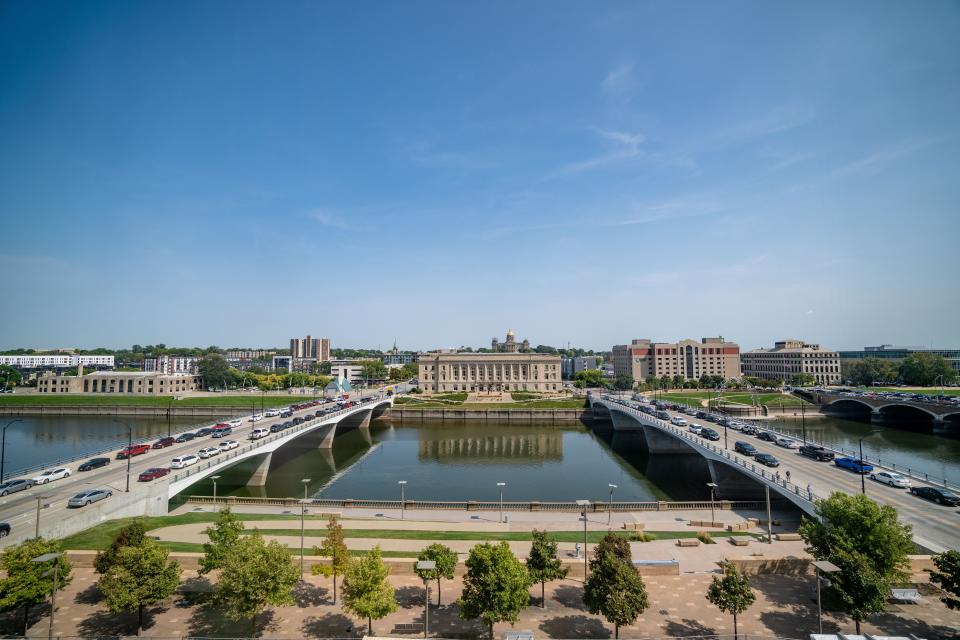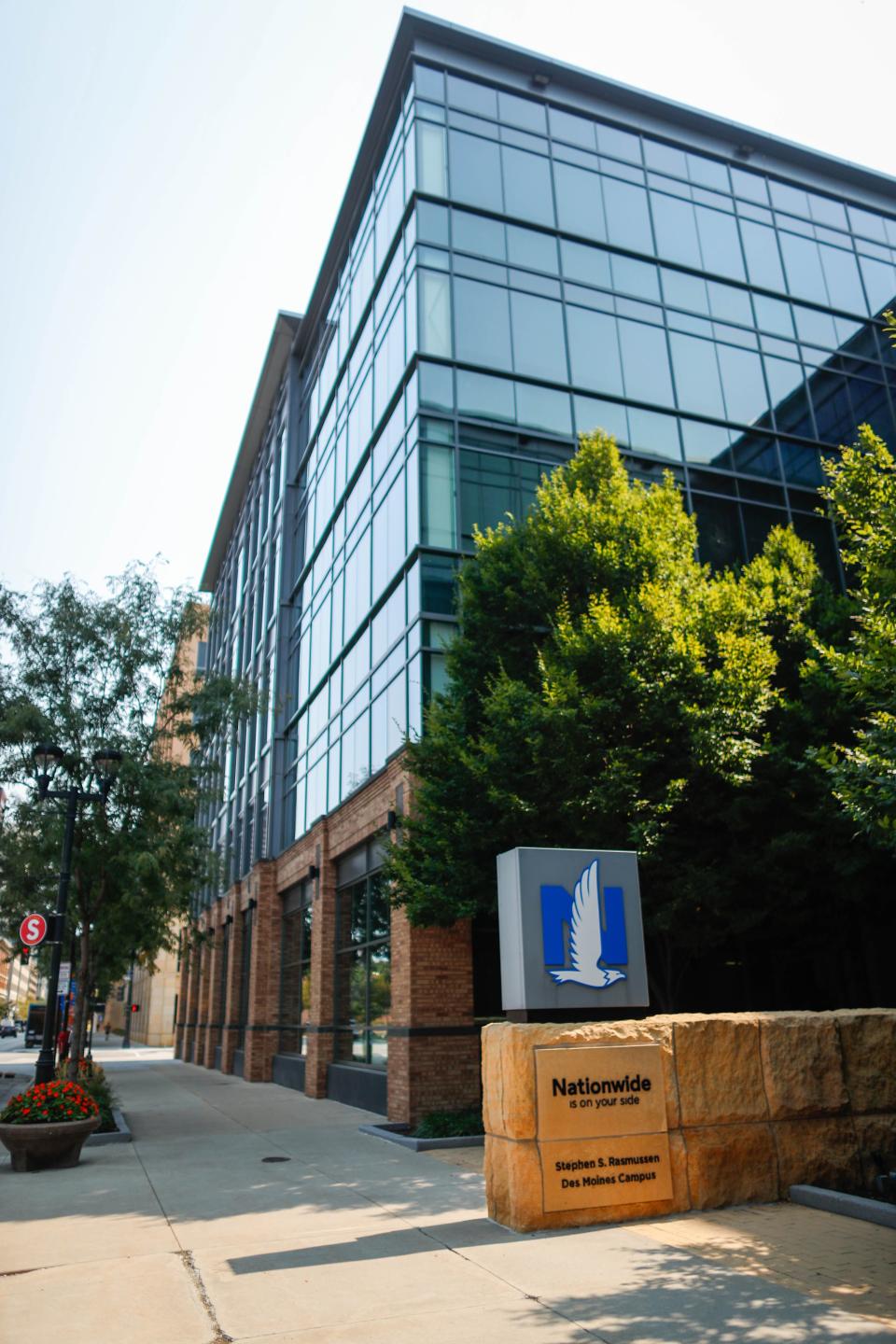East riverfront could be new spot for housing, dining if city workers move to Nationwide building

The east bank of the Des Moines River is on the cusp of substantial redevelopment should the city sell two municipal buildings and a vacant lot as part of a plan to consolidate its employees' workspaces.
Renovating the historic structures on the edge of the East Village could help revive an area now mostly void of visitors after work hours. Preserved amid a long history of revitalization, the Civic Center Historic District — comprised of a handful of municipal and federal civic buildings that adorn the riverfront — has long served as 8 a.m. to 5 p.m. offices for city employees.
But the city government's desire to move out of the buildings to expand and modernize its departments could change the district's fate by potentially bringing more housing, restaurants or entertainment.
From boutique hotels to condominiums, city officials say the sky's the limit for innovative architects looking to revamp the buildings, though developers warn the structures' unique natures could pose design challenges.

Des Moines City Council members approved a development agreement Monday to purchase a vacant Nationwide Mutual Insurance Co. office building. The $30 million deal would give the city the five-floor, 360,000-square-foot building at 1200 Locust St., which, once renovated, could serve as a new home for the Police Department and city workers operating in the century-old Argonne Armory on the riverfront.
While the city's deal with Nationwide would put more workers downtown — a win for shops and restaurants that have seen an exodus of weekday foot traffic since the start of the COVID-19 pandemic — it also would give hungry developers a chance to revive the riverwalk, said Deputy City Manager Matt Anderson.
The East Village — home to eclectic small businesses and restaurants frequented by tourists and locals alike — shares the east side of the river with municipal buildings including the police station, City Hall and the Argonne Armory. Also in the works is an 11-block portion of the Market District, a neighborhood that will feature dining, shopping and entertainment.
Anderson says the potential for new developments along the riverfront, through renovation or starting anew, could spark life into the area. He said the city's Office of Economic Development has already received calls from developers after the city announced its plan last week.
More: Downtown gets almost half of Des Moines' investment. Will it continue to pay off?
"Whether it's residential or hotel or other entertainment space, other restaurants, I think it has more of a catalytic impact on the existing businesses in the East Village and the businesses that will soon be coming to the Market District," he said. "I think it just adds more value to them and makes this side of the downtown an even more interesting place."
The three city sites that could be up for grabs:
Police headquarters, 25 E. First St., just off the Court Avenue bridge.
The Argonne Armory, 602 Robert D. Ray Drive, which houses the city's information technology, development services, neighborhood services and litigation departments.
The empty lot at 401 Robert D. Ray Drive east of City Hall. The city initially planned to build a replacement for the armory there.
The Government Services Administration also has said the historic federal courthouse at 123 E. Walnut St. will be available as surplus property once a new courthouse under construction on the west bank of the river opens next year.
City Council members approved the purchase of the insurance building downtown in a 6-1 vote Monday night. Council member Indira Sheumaker, who voted against the measure, said while it's a good move for some departments, such as IT, she was unaware the Police Department would be included in the deal.
"I don't believe it's appropriate for the police station to be in the same building as other city services where people can go to deal with city problems," Sheumaker said.
Other council members stood behind the purchase, saying the plan would be more efficient for the city and create a positive return on investment. Council member Connie Boesen called it a win for redevelopment in the community.
More in business: Iowa unemployment rate rises slightly to 2.6% though employers add workers for fifth straight month
From 'unsightly' to 'beautiful': New beginnings for the riverfront
The riverfront has a long history of revival.
At the turn of the 20th century, the east side of the riverbank was considered to be "uninviting collections of aged, low, ramshackle buildings, dingy iron bridges, and scraggly riverbanks plentifully decorated with tin cans, piles of rubbish and refuse of all kinds," according to a Jan. 3, 1915, story published in the Des Moines Register.
Within the first decade of the 1900s, the downtown riverfront transformed from one of the most "unsightly" spots in the city to one of the most "beautiful" with the addition of the Civic Center, and the former Coliseum and library, now the World Food Prize Hall of Laureates. The changes also included adding walls to the riverbanks.
The police headquarters, built 103 years ago, previously served as a municipal courthouse and as recently as the 1990s still had courtrooms on its second floor.
The Art Deco-style Argonne Armory, originally built to house 10 Iowa National Guard units and the Argonne post of the American Legion, was designed during the Great Depression. It was the last of seven municipal buildings constructed along the Des Moines River.
The Des Moines police station and the Argonne Armory are a few of the handful of municipal and federal civic buildings that still grace the riverfront along the east bank. Together they form the Civic Center Historic District, encompassing buildings and structures from the Center Street Dam to the Scott Avenue Dam, which is listed on the National Register of Historic Places and is part of the City Beautiful Movement.
The neighboring East Village, also a nationally recognized historic district, remains steady and strong with its charm and array of small businesses, Anderson said.
"These are government buildings that are 8 to 5, Monday through Friday," Anderson said of the Civic Center District, "yet we're kind of in an entertainment district seven days a week. I think new uses will just reinvigorate this area."
"I think there are great things ahead … for the East Village," he added.
More business: Iowa auto parts maker Dee Zee expanding to fill GM electric van orders
Developers showed prior interest in the riverfront
Four years ago, when city officials entertained putting the armory up for sale, three developers — including Jake Christensen, president of Christensen Development, who pitched a Live Nation concert venue — tossed their hats into the ring. Hubbell Realty Co. put in a bid for a mixed-use building, and Blackbird Investments proposed high-end condominiums.
Because the buildings were designed with specific municipal uses in mind, finding an adaptive use for the three buildings will be "difficult," Christensen told the Register this week.
"I think the list of possibilities is relatively short," he said, pointing to the concert venue his company proposed in 2018 as one of the few options that "uniquely fit" into the building's construction.
"I think that the market is going to have to have some time to absorb what those buildings are, and what has to stay in place, and then try to figure out what uses can fit inside it," he said.
Still, Christensen remains optimistic the space can help "activate" the riverfront.
When asked if he would still consider a concert venue, Christensen said he will wait for the city to present its goals for the buildings before he decides whether to pursue that plan.
Similarly, Hubbell Realty Co. leaders said the opportunity to develop the riverfront will enhance the community's interest in the downtown core. And, along with planning underway for recreational use of the river by ICON Water Trails, it could increase activation of the Des Moines River.
"Enhancements, like businesses, housing and new office space that would allow for in-and-out of water activities, will continue to draw more people — visitors and current residents — and more economic development potential," Hubbell's spokesperson Claire Brehmer said in an email.
Brehmer did not speak directly to the company's potential interest in the sites, but said, "This is prime real estate in downtown Des Moines and it will be exciting to see what’s next on the horizon."
All options are still on the table, according to Anderson.

"Anything that forms a historic rehab, to scrapping it and build new, we could do," he said during a City Council work session on Monday. "That, and anything in between."
He said the city won't be "prescriptive" when it issues requests for development proposals.
"We won't say … we want multi-family housing or we want condominiums, or we want office space," Anderson said. "I think you get in trouble when we dictate to the market what they should do. I trust the real estate experts to know what the balance is of supply and demand and what the highest invest-use of a parcel is."
More development: Des Moines metro home sales continue cooling trend in the latest report
Anderson is confident developers will show interest, but says the process will take time.
The city has a nine-month "due diligence" period to allow the city to examine how best to use the new Nationwide space and accommodate city employees before closing on the property.
The city wouldn't start transitioning employees into the new building until 2024. Sometime between closing and the transition, Anderson said the city will start issuing requests for proposals from developers and then select the top ones.
The site across from City Hall could have more of an aggressive timeline, and Des Moines could pick a developer by the end of 2023.
Virginia Barreda is the Des Moines city government reporter for the Register. She can be reached at vbarreda@dmreg.com. Follow her on Twitter at @vbarreda2.
This article originally appeared on Des Moines Register: Des Moines' plan to move employees could bring housing to riverfront
